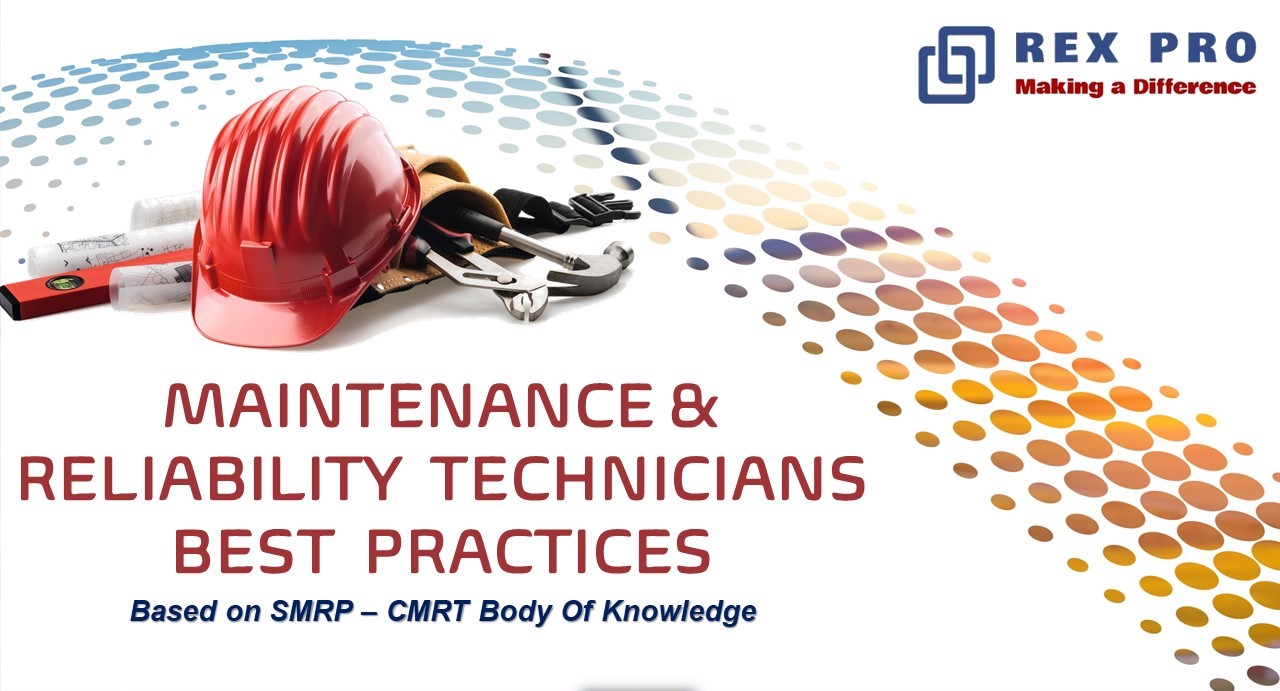| Training Code | Date | Duration | Venue | Fees |
|---|---|---|---|---|
| Keep following, we are updating our training schedules. | ||||
Maintenance & Reliability Technicians Best Practices - CMRT

Summary
- Maintenance Practices,
- Preventative and Predictive Maintenance,
- Troubleshooting and Analysis, and
- Corrective Maintenance.
Reference
SMRP - CMRT Body Of KnowledgeObjective
This
Rex Pro’s Maintenance & Reliability Technicians Best Practice workshop will
help you learn how to:
1.
Best Practices in Maintenance
Reliability Filed activities related to the safe and effective performance of
maintenance activities.
2.
Preventive and Predictive
Maintenance Best practices in PM, condition monitoring, and lubrication with
special focus condition monitoring technology capabilities
3.
Troubleshooting and Analysis Best
practices for performing troubleshooting activities related to breakdowns and
continuing equipment issues
4. Corrective Maintenance Best practices for performing corrective maintenance activities designed to restore equipment to full function with special emphasis on precision maintenance and installation practice
Who should attend
- Maintenance and Reliability Professionals / Specialists.
- Senior Maintenance, PdM & Condition Monitoring Technicians
- Maintenance Supervisors.
- New Maintenance & Reliability Engineers
- Maintenance Planning Engineers & Planners.
Additional Information
- Earning the CMRT credential indicates that a maintenance and reliability technician is a well-rounded, multi-skilled professional who can work safely & efficiently.
- Not only do attendees benefit from the knowledge and skills gained in the course, they also gain a globally recognized CMRT certification when passing the optional CMRT exam.
- When coupled with the output from the optional CMRT exam, an organization is able to build individual development plans for workforce development.
Maintenance & Reliability Technicians Best Practices - CMRT
- »» Introductions. & Overview of course contents. | Pretest 1
- »» CMRT Domains & Maintenance & Reliability Foundation 1
- »» EHS & Lockout / Tagout Procedure. 1
- »» Work Scheduling and Interfacing with Production 1
- »» Inspection & Use of special tools & equipment 1
- »» Maintenance Tools 1
- »» Handling Maintenance Materials 1
- »» Housekeeping 1
- »» Documentation 1
- »»Quiz Time 1
- »» Performing & Applying PM & PdM Activities 1
- »» Apply PdM Techniques 1
- »» Equipment Lubrication BP “ Best Practice" 1
- »» Rotating Equipment Alignment 1
- »» Safety System Integrity. 1
- »»Quiz Time 1
- »» Information Gathering & Collect Evidence 1
- »» Problem Verification 1
- »» Reviewing Maintenance History 1
- »» Using Tech. Documentation 1
- »» Identify the cause of Problem 1
- »»Quiz Time 1
- »» Verify Troubleshooting Analysis. 1
- »» Corrective Maintenance Best Practice. 1
- »» Functional test & Condition Monitoring. 1
- »» Operation Production Handover. 1
- »»Quiz Time 1
- Rex Pro Management Team believe that learning is not only about acquiring technical skills, it is also about learning behaviors & Competencies that are desirable for work in plant operation & maintenance critical dimensions. Our holistic teaching develops our delegates' personal effectiveness to function both as an individual and as a team player. The course delivery & modes of instruction will incorporate theory , practical skills and Q&A sessions.
- To enhance learning outcomes, theory sessions will comprise classroom based lecture that will intersperse with interactive discussions, scenario-based, case-study, group exercises, video clips, power point slides, learners' Guide and the application of various tools which will be provided to help in the delegates and participants of the learning’s objectives. With successful implementation of the learnt skills they are bound to enhance Individual & Organizational growth.
- For online / Interactive Virtual sessions, Delegate should have a stable & good Internet connection on his Laptop.
On successful completion of this training course, REX Pro’s Certificate with eligible Continuing Professional Education credits (CPE), will be awarded to the delegates , one CPE credit is granted per 50 minutes of attendance
Course Features
- Core : Training
- Category : Maintenance & Reliability Engineering
- Days : 4
- Duaration : 24 Hours
